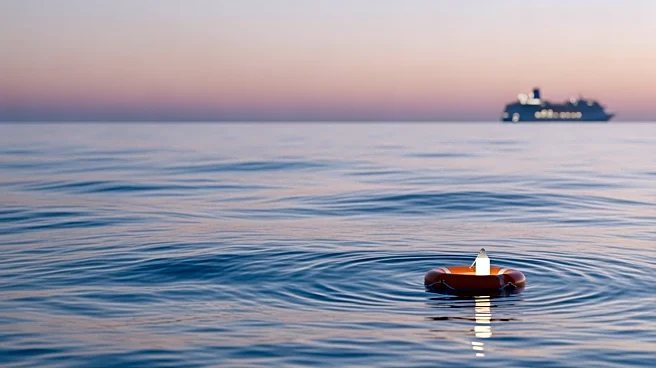What's Happening?
An elderly man from Melbourne died after going overboard from the Disney Wonder cruise ship on November 22nd. The incident occurred in the Tasman Sea, between Australia and New Zealand, during a five-night
voyage that began in Melbourne. The ship altered its course at 4:35 a.m. to initiate a search and rescue operation, employing thermal imaging and surveillance cameras to locate the man. Despite a search lasting five hours, the man was not found and is presumed dead. Victoria Police have stated that the death is not being treated as suspicious, suggesting it was a suicide. The Disney Wonder is equipped with a man overboard (MOB) system, which likely alerted the crew to the incident, allowing them to respond quickly.
Why It's Important?
The incident highlights the importance of safety measures on cruise ships, particularly the use of man overboard systems. These systems are crucial for timely responses to emergencies at sea, potentially saving lives. Disney Cruise Line is noted for complying with the Cruise Vessel Security and Safety Act, which mandates the installation of MOB systems. This compliance underscores the company's commitment to passenger safety. However, the tragic event also serves as a reminder of the dangers associated with going overboard, especially at night in open waters. It raises questions about mental health support and monitoring on cruise ships, as well as the effectiveness of current safety protocols.
What's Next?
Following the incident, there may be increased scrutiny on cruise ship safety measures and protocols. Disney Cruise Line and other companies might review their procedures to prevent similar occurrences. Discussions around enhancing mental health support for passengers could emerge, aiming to address potential issues before they escalate. Additionally, regulatory bodies might consider revisiting safety standards to ensure they are adequate and effectively implemented across the industry.
Beyond the Headlines
The incident could lead to broader discussions about the mental health challenges faced by individuals on cruise ships, especially during long voyages. It may prompt cruise lines to invest more in passenger support services, including counseling and monitoring systems. Furthermore, the event might influence public perception of cruise safety, potentially affecting the industry's reputation and passenger trust. Long-term, this could drive innovation in safety technology and protocols, aiming to enhance passenger security and well-being.









